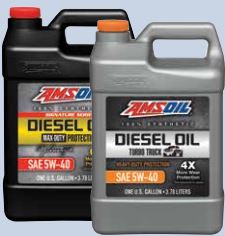Can I Use Diesel Oil in My Gas Engine?
Motorists may favor diesel motor oils over their gasoline counterparts for a few different reasons.
- Diesel oil is perceived as more “heavy-duty” than gasoline oils
- Some motorists desire a higher viscosity, and it may be easier to find a 5W-40 or 15W-40 diesel oil than gasoline oil
- Diesel oil typically contains more robust detergency additives than gasoline oils
It is safe to use a diesel oil in your gasoline engine, provided the diesel oil meets the appropriate specifications and viscosity requirements of your engine. For example, if your gas engine calls for a motor oil that meets the API SN specification, you can safely use a diesel oil of the correct viscosity that meets the API SN spec. For the typical gasoline application, however, a diesel oil isn’t required and the more appropriate choice is a quality gasoline motor oil for both performance and value.
Pay attention to oil specifications
The American Petroleum Institute (API) publishes its “C” category of specification for diesel oil (currently CJ-4) and its “S” category for gasoline motor oil (currently SN). It’s common for today’s diesel engine oils to carry both the API CJ-4 and API SN specifications. Though they’re truly designed for diesel applications, they can be used in gasoline applications for motorists who want to use one oil in all applications. If the diesel oil carries both specs, the oil is safe to use in diesel and gasoline applications. If the diesel oil does not carry the “S” category, AMSOIL strongly recommends against using it in gasoline applications.
The correct oil formulation for the application
In the past, motorists may have been told diesel oils were tougher than passenger car oils for a number of reasons, including higher viscosity, improved corrosion protection, higher Total Base Number and more. Diesel oils are often thought to be formulated with special components not available in gasoline motor oils, such as more robust detergency additives to handle the soot inherent to diesel engines. In some motorists’ minds, diesel oils are still analogous to better protection.
While that may have been true in the past, modern oils are formulated for their intended applications. While both diesel and gasoline oils contain many of the same additives to guard against wear, corrosion, foaming and more, they also contain additives designed to manage the byproducts of combustion. Some of those byproducts change, depending on whether the engine runs on gasoline or diesel fuel. If your vehicle uses a gasoline engine, it’s best to use an oil that contains the correct additives to handle the byproducts of gasoline combustion. The same holds if you’re operating a diesel engine.
When to favor diesel oil over gasoline motor oil
If your gasoline engine is heavily modified to put out more horsepower, using a diesel oil can be beneficial. It’s likely modified engines will need a higher viscosity to withstand the increased stress. You can turn to diesel engine oils for those needs or you might want to consider a racing oil, depending on your engine modifications and lubrication requirements.
Many times the engine builder will help provide insight as to what success they have found. Outside of that, if you have a bone-stock gasoline-powered application it’s best to stick with a gasoline motor oil. They are designed for that type of application and have the components required to manage that engine






